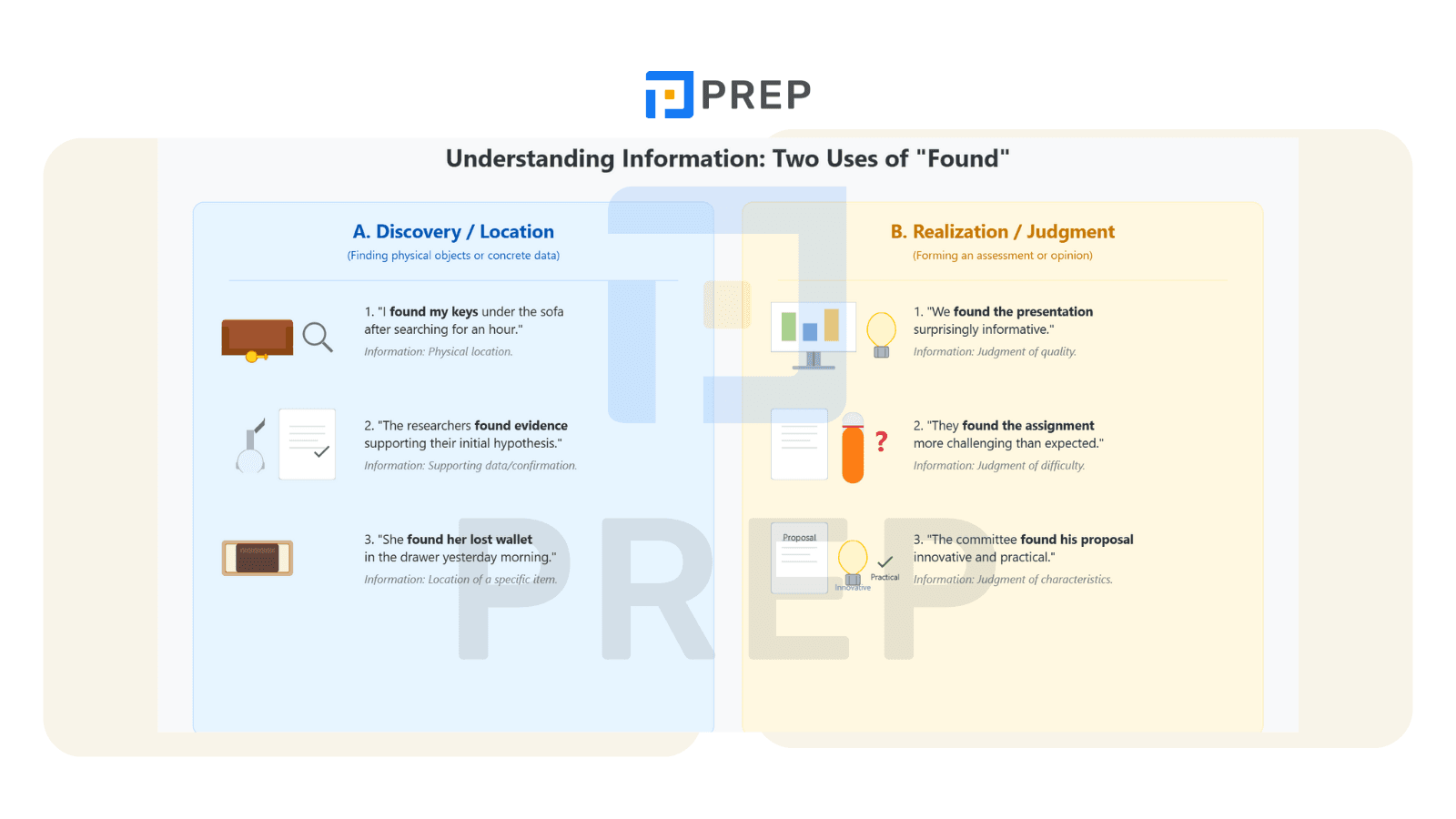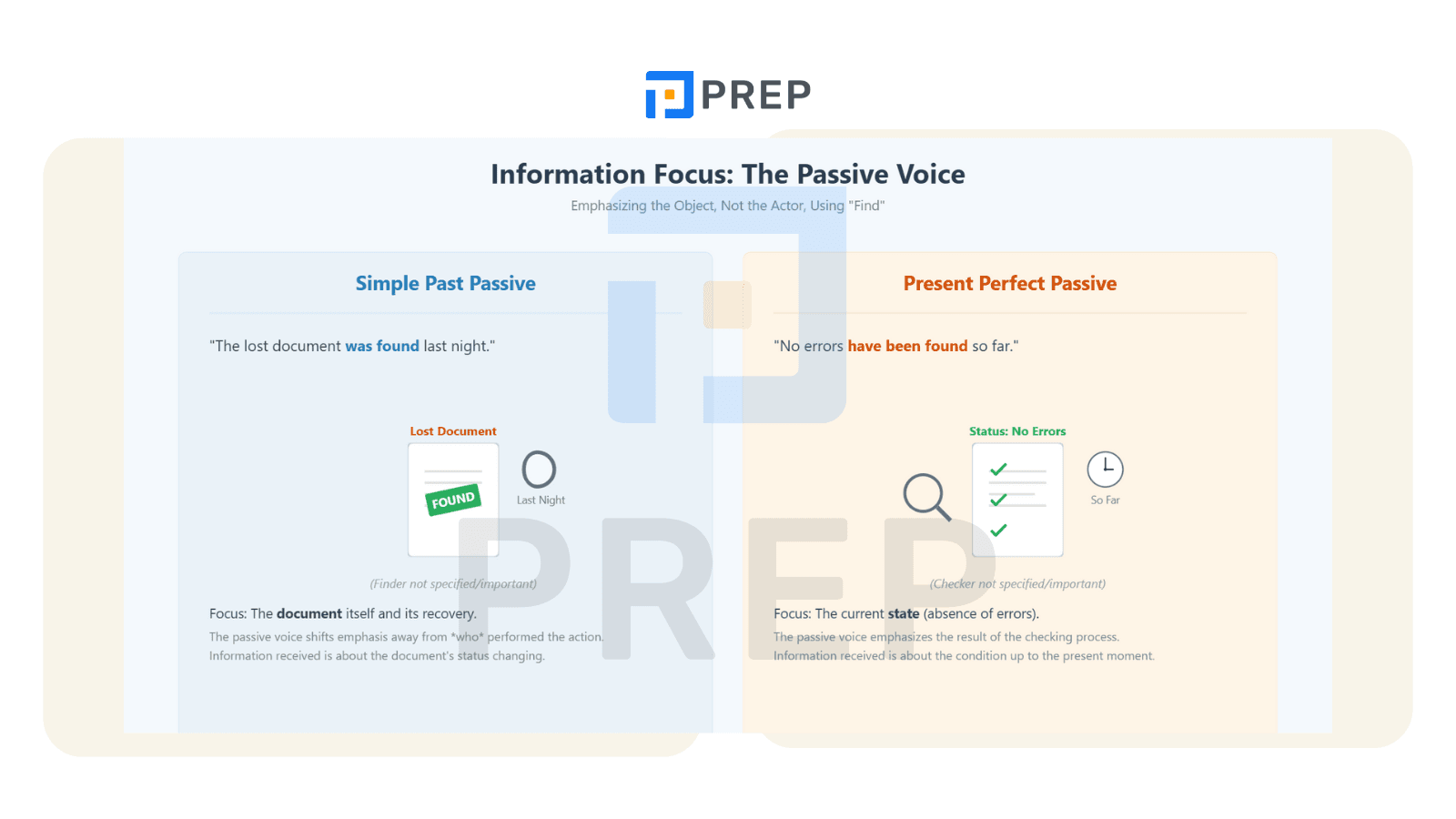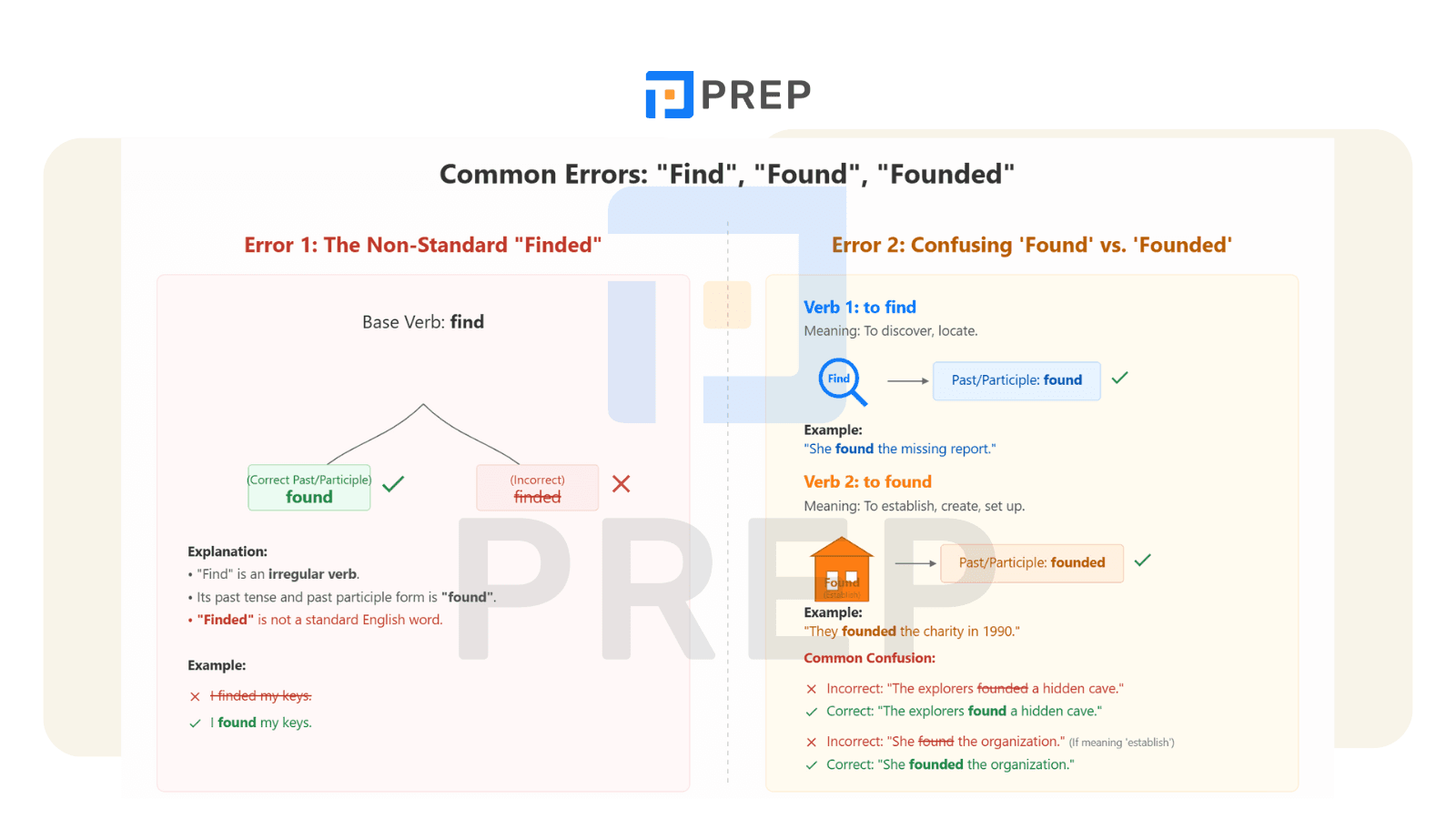Unlocking "Found": Your Definitive Guide to the Past Tense of Find
This comprehensive guide explains the past tense of "find" in English grammar. It establishes that "found" serves as both the simple past tense and past participle form of "find," making it an irregular verb with the structure find/found/found. The content details proper usage in affirmative sentences, negative constructions (using "didn't find"), questions ("Did you find?"), perfect tenses, and passive voice. It clarifies common errors like using the non-existent "finded" and distinguishes between "found" (discovered) and "founded" (established). The guide also identifies other irregular verbs with identical past tense and past participle forms, providing a pattern-based learning approach for English language learners.

I. The Past Tense of Find in English
The form of the verb Find in past simple tense is Found. Similarly, the Find past participle form is also Found. This makes "find" one of many English verbs where the Find past tense and past participle share the same form.
The Three Principal Parts: Find / Found / Found
-
Base Form (Infinitive): find
-
Simple Past Tense: found
-
Past Participle: found
Note: both the simple past tense and past participle of "find" are identical, which simplifies learning but can sometimes cause confusion in determining which tense is being used.
II. How to Use 'Found' Correctly
Now that we understand "found" is the correct past tense form, let's explore how to use it properly in various contexts. The simple past tense describes completed actions that occurred at a specific time in the past. Mastering its application ensures precise and effective communication.
1. Basic Sentence Structure: Subject + found + Object/Complement
The standard pattern for using "found" in simple past tense statements follows this structure: Subject + found + Object/Complement. This straightforward formula makes constructing basic sentences relatively simple.
a. Examples: Showing discovery or location
-
I found my keys under the sofa after searching for an hour.
-
The researchers found evidence supporting their initial hypothesis.
-
She found her lost wallet in the drawer yesterday morning.
b. Examples: Showing realization or judgment
-
We found the presentation surprisingly informative.
-
They found the assignment more challenging than expected.
-
The committee found his proposal innovative and practical.

2. Forming Negative Sentences
To form negative sentences in the simple past tense, we use the auxiliary verb "did not" (or its contracted form "didn't") followed by the base form of the verb "find"—not "found." The auxiliary verb carries the past tense marker, allowing the main verb to return to its base form.
a. Using "did not find" (didn't find)
The structure for negative sentences is: Subject + did not + find + Object/Complement.
b. Example: He didn't find any cheap flights to Singapore.
This demonstrates the correct negative construction in the simple past tense.
3. Asking Questions in the Simple Past
For questions in the simple past tense, we use the auxiliary verb "Did" at the beginning of the sentence, followed by the subject and the base form of the verb "find." Again, the auxiliary verb carries the past tense marker.
a. Using "Did [subject] find...?"
The structure for questions is: Did + Subject + find + Object/Complement?
b. Example: Did you find everything you needed?
This illustrates the proper question formation in the simple past tense.
III. 'Found' as a Find Past Participle
"Found" not only functions as the simple past tense of "find" but also serves as its past participle form. This additional role makes it essential for constructing perfect tenses and passive voice sentences—more advanced grammatical structures that add depth and precision to your English expression.
1. Essential Role in Perfect Tenses
Perfect tenses relate actions or states from different time points. They use forms of the auxiliary verb "have" combined with the past participle "found" to express completed actions with varying relationships to the present or other past events.
a. Present Perfect (Have/has Found): Action completed with present relevance
The present perfect connects past actions to the present moment, showing relevance or continuation into the present time.
-
She has found her passion in environmental science.
-
We have found several qualified candidates for the position.
b. Find Past Perfect (Had Found): Action completed before another past action
The past perfect expresses actions completed before another past event, establishing a sequence of events in the past.
-
By the time they arrived, I had found the solution to the problem.
-
He realized he had found the wrong document after sending the email.
2. Essential Role in the Passive Voice
The passive voice shifts focus from the doer of an action to the receiver. It combines forms of "be" with the past participle "found" to emphasize what happens to the subject rather than what the subject does.
a. Structure: Form of 'be' + found
This construction places emphasis on the object being found rather than who found it.
b. Example (Simple Past Passive): The lost document was found last night.
This sentence focuses on the document rather than who found it.
c. Example (Present Perfect Passive): No errors have been found so far.
This construction emphasizes the state of the errors rather than who did the checking.
d. Formal Usage ('It was found that...'): Common in reports (IELTS Academic/TOEIC relevance)
This passive construction appears frequently in academic and formal writing, particularly in research papers and reports.
-
It was found that the previous method produced inconsistent results.

IV. Avoiding Common 'Find/Found' Errors
Even seemingly simple words like "find" can lead to confusion and errors. Understanding two major pitfalls related to "find" and "found" will help ensure accurate and effective communication in English.
1. Error 1: The Non-Standard "Finded"
"Finded" is incorrect in standard English and should never be used as the past tense of "find." This error typically occurs when English learners over-apply the regular verb rule of adding "-ed" to form the past tense.
a. Explanation: Why "finded" is incorrect and how the error arises.
This error stems from treating "find" as a regular verb when it's actually irregular. English learners sometimes generalize the "-ed" rule before learning irregular forms, resulting in this non-standard usage.
b. Reinforcement: Always use "found" for past tense/participle.
Remember that "found" is the only correct form for both the past tense and past participle of "find" in standard English.
2. Error 2: Confusing 'Found' (from Find) vs. 'Founded' (from To Found)
A common source of confusion involves mistaking "found" (the verb form of Find in the past tense) with "founded" (the past tense of "to found"). Though they look and sound similar, they come from entirely different verbs with distinct meanings.
a. Defining 'To Found': Meaning "to establish" or "to base something on."
The verb "to found" means to establish, create, or set up an institution, organization, or theory. It's completely separate from the verb "find," which means to discover or locate something.
b. Past Tense of 'To Found': Founded (regular verb: found, founded, founded)
Unlike "find," the verb "to found" is a regular verb, with "founded" as both its past tense and past participle forms.
c. Side-by-Side Comparison for Clarity
Understanding the distinction between these two verbs is crucial for precise communication:
|
Aspect |
"Found" (past tense of "find") |
"Founded" (past tense of "found") |
|
Verb Type |
Irregular verb |
Regular verb |
|
Base Form |
Find |
Found |
|
Meaning |
Discover, locate, come across |
Establish, create, set up |
|
Example Usage |
They found ancient artifacts. |
They founded a research institute. |
|
Grammatical Structure |
Object is something existing that was located |
Object is something new that was created |

V. Frequently asked questions & deeper insights about 'Found'
Here are answers to some common questions that learners often have about "found" and related concepts.
1. Is 'finded' ever considered correct in any English dialect or specific context?
No, "finded" is not considered correct in any standard dialect of English. While very young children might use it during language acquisition before learning irregular forms, and it might occasionally appear in highly non-standard dialects, it remains incorrect in educational, professional, and formal contexts. English learners should always use "found" as the past tense of "find."
2. What are some common phrasal verbs that use "find" (and thus "found" in the past)?
Several important phrasal verbs incorporate "find":
-
Find out / found out: to discover information or learn something
-
Find oneself / found oneself: to realize one's situation or true nature
-
Find against / found against: to make a judgment contrary to someone
3. Besides 'find', what are 3-5 other common English verbs that share the same form for their simple past and past participle?
Several common English verbs follow the same pattern as "find," with identical forms for both the simple past and past participle:
-
bring/brought/brought
-
teach/taught/taught
-
catch/caught/caught
-
sell/sold/sold
-
buy/bought/bought
VI. Conclusion
You've now gained a comprehensive understanding of the past tense of find in all its forms and contexts. This knowledge represents more than just memorizing a word form—it demonstrates your growing command of English grammar fundamentals. Continue building on this foundation through regular practice and application. PREP stands ready to support your ongoing language journey with expert guidance and resources tailored to your specific learning goals.

Hi I'm Chloe, and I am currently serving as an Product Content Administrator at Prep Education. With over five years of experience in independent online IELTS study and exam preparation, I am confident in my ability to support learners in achieving their highest possible scores.
Comment
Premium content
View allPersonalized roadmap
Most read












